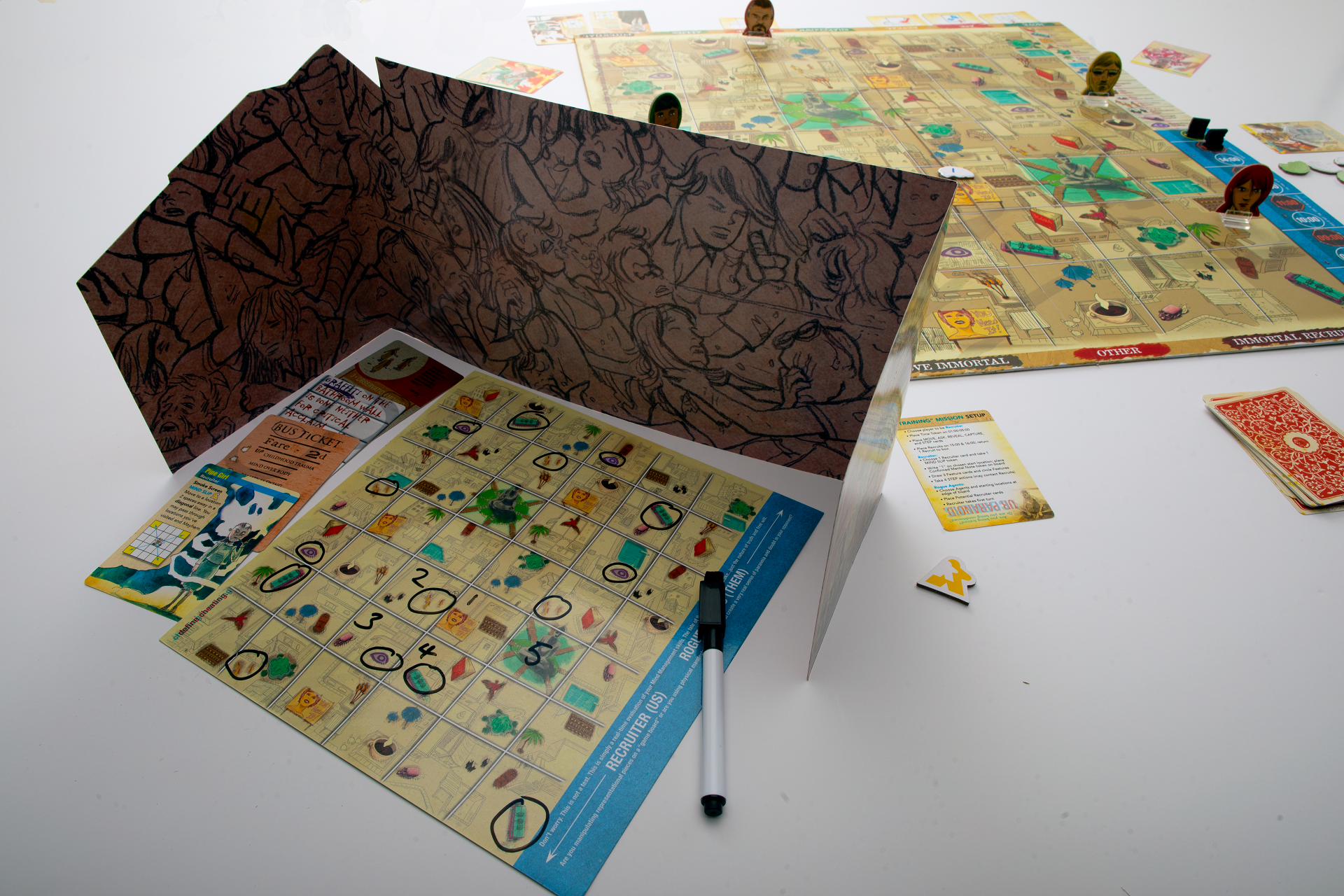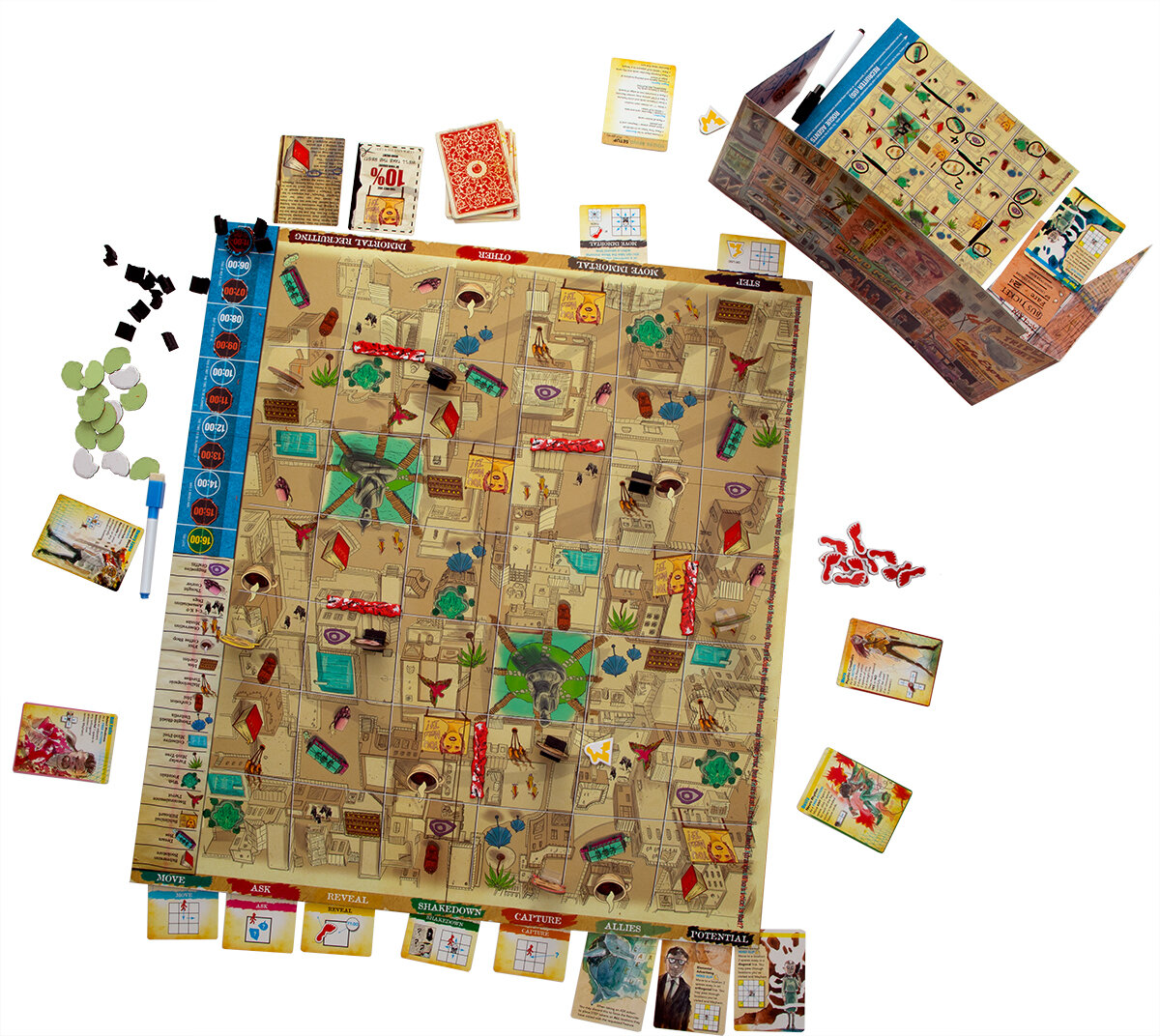Mind MGMT– First Impressions
Review copy provided by the publisher
Technically, MIND MGMT is a graphic novel series by author and illustrator Matt Kindt that reveals the shadowy reach of the Mind Management program, an organization whose tendrils stretch throughout the course of modern history. It has influenced the past, steers the present, and prepares for the future with psychic warfare, subliminal and mesmeric advertising, and… immortals.
Based on the art alone, it’s a hypnotic fever trip through an alternate history and Matt Kindt is the conductor on this mad train.
However, with all things worthy of artistic depiction, it’s evolved and entered into a new world. It’s crawled into our heads like a slick Ceti eel so that we’re suggestible to the idea of another board game.
From Jay Cormier and Sen-Foong Lim, two consummate board game designers with a lot of titles under their belts, Mind MGMT is a love letter to Matt Kindt’s narrative and the first title from Off the Page Games, which intends to focus on creating and publishing comic-based games.
And, to the benefit of all who will play the game, Matt Kindt joined the development of the game and is the singular artist who has helped bring his psychically damaged world to a whole new audience.
It’s a grid-based hidden movement game with variable player powers for 1-5 bold Rogue Agents (and sinister Recruiters). The Kickstarter campaign for the game concluded in early April of 2020 with over 2000 backers, and it’s now getting out there into the wild. Like the Rogue Agents it houses, the game has escaped the clutches of the system and is floating on the winds toward eager tabletops.
Mind MGMT is out there. It’s wacko. And it’s one of the first games in a while in which I can’t wait to lose.
What It Does
You don’t have to understand the conflict of the MIND MGMT graphic novel series to appreciate the game, but it certainly helps to immerse you in the underdog struggle (or the wide-reaching machinations) if you’re familiar with the world Matt Kindt has built.
Let’s start with the great evil (or the greatest good). Mind MGMT is a covert, global operation that utilizes agents with psychic powers. The subversive group stops crises around the world but they work in the shadows and the background, never revealing themselves to the masses. But that kind of power, that kind of influence, will eventually turn good people into corrupt ones. Mind MGMT is out of control, and there are now rogue agents actively fighting against it.
Psychically-powered individuals with a penchant for righting wrongs. It’s the exiles versus the puppetmasters.
In Mind MGMT: The Psychic Espionage "Game", it’s one player versus the rest. The solitary sleaze controls the Recruiter, a local representative of the syndicate, while the remaining stalwart figures at the table band together as the Rogue Agents.
The Recruiter must move through the city subtly, picking up new recruits along the way and directing the Immortals to interfere with the, well, interference of the Rogue Agents, who will stop at nothing to track down and capture the unthinking pawn of Mind MGMT.
The Recruiter must attract new followers to the organization by locating features around the map. Immortals are used to also recruit, but their other purpose is to harass, hinder, and slow the progress of the Rogue Agents. These plucky outcasts have to ask questions, keep careful notations of any movements or hinted activities, and then get in the face of Immortals and the Recruiter before Mind MGMT wins again.
Mind MGMT has the advantage, though. The lone player wins by either collecting twelve recruits or surviving sixteen turns without capture. The Rogue Agents must capture the Recruiter. That’s the only way to stop the psychic assault on the public and break the vice grip of mental despotism that this regime has developed.
How It Does It
This is one of the cleverest hidden movement games I’ve played because it grows with you and rewards both the winners and the losers in every game.
But I’m getting ahead of myself. Let’s start with the basics. Use the picture above as a reference. And if it starts to sound too complicated, it’s really not once you have the game in front of you and there is also a training mission that gets you on your feet and playing pretty quickly.
The Recruiter operates behind a screen (of lies!) as they navigate the 6x7 grid one step at a time. That’s 42 squares, with two of them being variable movement Temple squares. Each square in the grid has two Features with vibrant colors that burst off of the beige background. There are 16 different Features, with five iterations of each across the map. That’s 80 Features evenly split into the 40 squares that remain when you exclude the two Temple squares. Of those 80 Features, the Recruiter will have a maximum of 15 to personally recruit from, as they draw 3 of the 16 Features at the beginning of the game. They can technically recruit from other Features using Immortals, but their personal movement and recruitment must follow those limitations.
Things the Recruiter has at their disposal:
Immortals, who block Rogue Agents’ captures and, more importantly, prevent certain Features from being Asked about
Mind Slip movement, which allows a two-square movement rather than the one-square restriction of a normal Step (and is either orthogonal or diagonal in a direction depending on the Recruiter in play)
Sneakiness and an all-consuming psychic need to control the masses…
The game wouldn’t be fun though if there wasn’t any competition!
Crouching backstage rather than entering stage left are the Rogue Agents, the former (and maybe disillusioned, if you’re on the right side of things, am I right?) executors of Mind MGMT’s will across the nations.
These psychic warriors are here to bring down the behind-the-scenes regime. With authoritah!
Rogue Agents have a wider arsenal of actions and abilities because their job is a tough one. They must track down and capture the Recruiter before time runs out or the recruitment limit has been reached. They’ve got two ways to lose and only one way to win.
Here’s what they can do:"
Move up to two spaces for each activation
Ask about Features (if it’s not blocked by Immortals) and if the Recruiter has visited them
Reveal locations with Step tokens to determine exactly when the Recruiter was there.
Shakedown Immortals to guess (and possibly invalidate) one of the Recruiter’s three Features
Capture the Recruiter if occupying the same space
Use Allies and their abilities
Activate special actions that each Rogue Agent possesses
They’ve got the hardest job, but the coolest psychic powers. Who knew going Rogue could be so sexy?
So, we’ve detailed the basics for the most part. It’s a hidden movement game. One side is sneaky. The other side is dogged in their pursuit of the trail.
Here’s where things get interesting, though.
Jay and Sen-Foong have introduced something called the SHIFT System. There are unlockable packages for both the Recruiter and the Rogue Agents. When a game concludes, the losing side gets to open one. Inside will be a component, rule tweak, innovative mechanic, etc. that will help that side in the next game. And at first, you might look at it as a handicap. That’s not really accurate to what this game is doing, though.
It’s an escalation. This game is going to grow with you. It’s going to get bigger. It’s going to get nastier. And it’s going to get more fun.
Hence why I mentioned I can’t wait to lose. I’ve played four missions so far. As the Recruiter, I won the Training Mission, but that’s the “Hello and welcome to Mind MGMT” version of the game so we didn’t unlock anything there. Then, for the first full game, I won again. And the Rogue Agents got to open up their first SHIFT package. The third game was over insanely fast, though, because I made a mistake (moving through Mayhem) and had to divulge so much information that there was no longer any “hidden” part to my movement. Finally, in our fourth game, I squeaked out a win, though the Rogue Agents’ abilities and their unlocked SHIFT power definitely made it a close-shave once again. And they unlocked their next SHIFT package, making the game harder for me.
It’s not a legacy game, though. This isn’t something that you necessarily have to play with the same people. I encourage it because it enhances the atmosphere and the experience, but it’s not essential.
Yet the SHIFT System does something so special. It creates an attachment and a personal story to the game that campaign or legacy games do, but it does so by simply growing the game. This could easily have been introduced as a hidden movement game where all of the content from the SHIFT packages were already accessible and it would have been a mess. It would have appeared too convoluted and jumbled, I think. Instead, it’s eating an elephant one SHIFT-y bite at a time.
Mind MGMT is doing a lot. And almost all of it is right.
Why You Might Like It
Mind MGMT rewards you for your play—it doesn’t matter if you won or lost. The game wants to give you new abilities, powers, and way to explore the possibilities of the hidden-movement system.
The art and production—which I haven’t even really talked about yet—are just gorgeous. Matt Kindt is wearing his salesman hat on top of his illustrator hat because this whole package was designed to draw your eyes… and take over your mind!
Why You Might Not
The SHIFT System introduces new components or mechanisms which can slightly alter the gameplay for one side or the other. If you’re a player who wants all the rules one time and no fluctuations than the minute changes in successive games may come to bother you.
The art, while sumptuous, may seem strange to some who are used to the more striking imagery of fantasy and sci-fi illustrations rather than the understated yet zany zine look that Mind MGMT boasts.
Final Thoughts
The world of this game feels like V for Vendetta if it was visualized by Andy Warhol on an acid trip. It’s Letters from Whitechapel if Jack ratcheted up the scheme from serial killing to mass manipulation. Or maybe it’s like 1984 if that narrative had life and color.
Whatever comparison you want to attempt, at the end of the day, Mind MGMT is its own thing. Working with the creator of the comics, Jay Cormier and Sen-Foong Lim have crafted an innovative hidden-movement game that feels special. I am so ready to see what awaits our group as we delve deeper into the madness of Rogue Agents and mind control. I can’t wait to discuss what pitfalls lie ahead of the Recruiter if they continue to succeed. Just as eagerly, I look forward to the devilish powers and subterfuge that I can unlock should I fail to recruit enough hapless suckers in this world.
I am stoked to return to a world of C-4 K-9 Assassination Dogs and Hallucinogenic Torches. And all of the other nonsensical mayhem that oozes out of the box when you open up Mind MGMT.
There is a lot of game left to discover, but what’s here is really promising. I’ll wait for a more in-depth review once I’ve got more management experience with my mind (a daunting task lies ahead of me).
Here’s the short and sweet: This plays in under an hour. Just as you get a handle on the scope of the game, it evolves in a way that forces you to consider new paths and combinations. It’s a worthwhile process of adaptation, however, because it slowly incorporates a really grand and ambitious project into bite-size pieces. And the players are given the agency to take those bites when they’re ready for a bigger meal.
Maybe that’s the best way of describing the game. Mind MGMT is a reverse buffet that’s controlled by the restaurant owners.
You come in and get a plate. When you’ve finished, they’ll serve you another appetizer. Possibly an entree. But they control the pace. And at the end, you’re completely stuffed, in that good way that means a nap is coming, and you probably would have overwhelmed yourself if you hadn’t relied on the good tastes and instincts of the ones pulling the strings.
Is that how all buffets should be? Who knows. It doesn’t matter. What does matter is that Mind MGMT is here. And you should be paying attention.
If you want to check out Mind MGMT, you can visit Off the Page Games or read what the community thinks on BoardGameGeek.
Have you played hidden movement games like Mind MGMT? What’s your favorite one?
Let us know in the comments and give a recommendation for other games of which to share our first impressions.






